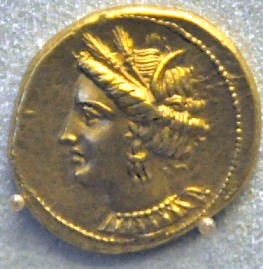Heliogabalus' Religion (3)
Heliogabalus: emperor of Rome, ruled from 218 to 222, famous for his religious reforms and the introduction of the cult of the Syrian sun god Elagabal.
Conclusion
Heliogabalus refused to live a Roman life. He followed the rules of Syrian religion. His high priesthood required much of him every day, so he neglected his imperial tasks, which he left in the hands of his mother Julia Soaemias and grandmother Julia Maesa. The Syrian customs were brought to Rome and Heliogabalus continued to live as he had done in Emesa.

The cult of Elagabal was already known, but he also tried to introduce the other members of the Emesene triad. By marrying the priestess of Vesta and bringing the palladium to the temple of Elagabal, he had brought one of the female deities of the Emesene triad back to her rightful place. Then the Carthaginian goddess Tanit was brought to Rome and possibly married off to Elagabal. Now, Heliogabalus had brought home the second female deity of the triad.
By doing so, he violated many Roman laws. Other Roman deities were desecrated by bringing their cult objects to the temple of Elagabal. However, Heliogabalus did not wish to destroy the other gods or their cults. The moving of the cult objects is just another step that was misunderstood. The emperor may have seen Elagabal as basileus ("king") and the other gods as part of the sun's household. These actions and other exotic cult acts were not understood by the Romans who saw their laws and morals violated. The emperor, who was clad in his wealthy silk robes and costly jewelry during the sacrifices, accompanied by music and dancing, may have been spectacular in the beginning but afterwards there was no interest anymore. The insolence the emperor displayed had never been seen before.
The charges of prostitution, castration and possibly child sacrifice may be seen as truthful. Although temple prostitution and castration are usually linked to female deities, Heliogabalus may have wished to perform these acts because they were part of the cult of Atargatis and Astarte, the female deities in the Emesene triad. At the same time, there must be an element of exaggeration in the biographies on the emperor. His religion was misunderstood, the emperor was detested, and who was to stop the historians from "improving" the facts for a little bit of entertainment? Especially the author of the Historia Augusta knows how to work things up. He even has the audacity to accuse others of making up charges to discredit the emperor, but he uses them all the same and added many charges himself.
The infiltration of the cult of Sol Invictus Elagabal in Rome was a slow progress that started early and took years to complete, due to the opposing attitude of the Romans. Eventually the cult flourished in the third century. It did not disappear once Heliogabalus was dead. It is most likely that many Romans had already made their acquaintance with this cult before Heliogabalus' arrival, either through commerce or because of military careers. It seems likely that after Septimius Severus married Julia Domna, he started to bring more Syrian customs to Rome and may have propagated the cult. The cult of Sol Invictus did penetrate Roman life for four years because it was highly propagated by the emperor himself.
The sources mention criticism, coming mostly from prestigious and noble men. After a while voices of discontent were heard among the people and soldiers as well. These people criticized a religion of which they knew so very little. It was not like religion as they knew it. Semitic religion may have been known to Romans, and possibly even practiced, but Sol Invictus was publicly worshipped by no other than the emperor himself. The man who was expected to represent Roman virtues, was a Syrian in all his ways and merely proved that all prejudices were right. The acts of the emperor may have been quite normal in Emesa, in Rome it was unacceptable.
If the accounts on the emperor truly voice the general opinion of most Romans, we at least have an answer as to how the cult was perceived, starting with criticism coming from the nobility, which was soon to be backed up by the populace and the soldiers. The cult cannot have had many noble devotees. They were expected to participate in the daily sacrifices and Heliogabalus thought that he bestowed great honor on them by doing so. If the Roman nobility ever had any plans on joining this cult, Heliogabalus' exotic behavior would soon have changed their minds.
Romans were tolerant towards other religions as long as the Roman laws and morals were respected. This young emperor, however, did not show this respect, and could not lead the empire with exemplary behavior. Few will have regretted his death.
Literature
Ancient sources
- Cassius Dio, Roman History, book 79-80
- Herodian, History of the Roman Empire since Marcus, book 5
- Historia Augusta, "Caracalla", "Macrinus", "Heliogabalus", "Alexander Severus"
Secondary literature
- A.R. Birley: Septimius Severus, the African emperor, London (1971)
- Martin Frey: Untersuchungen zur Religion und Religionspolitik des Kaisers Elagabal, in: Historia: Zeitschrift für alte Geschichte. Einzelschriften. Heft 62, Stuttgart (1989)
- Gaston H. Halsberghe: The cult of Sol Invictus, Leiden (1972)
- Theo Optendrenk: Die Religionspolitik des Kaisers Elagabal im Spiegel der Historia Augusta, Bonn (1968)
- M. Pietrzykowsky: "Die Religionspolitik des Kaisers Elagabal", in: Aufstieg und Niedergang der römischen Welt II 16.3 (1986) 806-1825
- G.R. Thompson: Elagabalus, priest-emperor of Rome. Diss. University of Kansas, Kansas (1972)